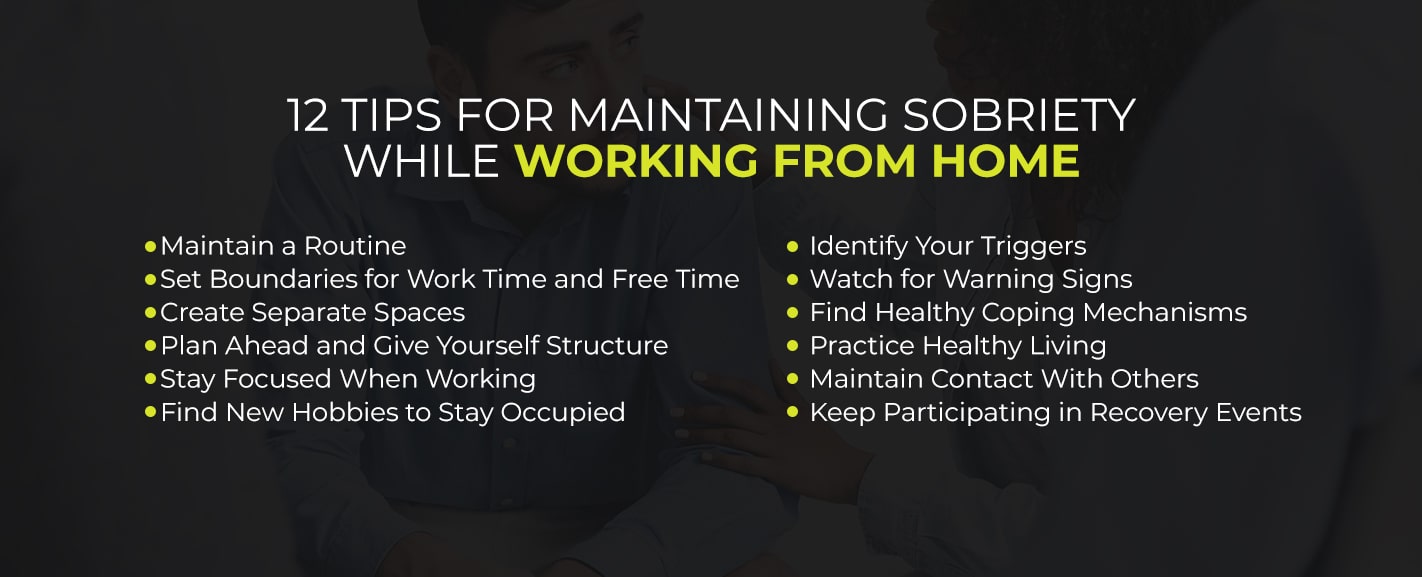- Oct 29
- Drug Addiction Treatment
Recovering from a substance use disorder requires structure, self-care and sound mental health. All of these things can be disrupted with work-from-home structures and social distancing. Staying sober while working from home takes even more vigilance and effort than it normally would. You can use many different strategies to help you stay on track while working from home.
- 12 Tips for Maintaining Sobriety While Working From Home
- 1. Maintain a Routine
- 2. Set Boundaries for Work Time and Free Time
- 3. Create Separate Spaces
- 4. Plan Ahead and Give Yourself Structure
- 5. Stay Focused When Working
- 6. Find New Hobbies to Stay Occupied
- 7. Identify Your Triggers
- 8. Watch for Warning Signs
- 9. Find Healthy Coping Mechanisms
- 10. Practice Healthy Living
- 11. Maintain Contact With Others
- 12. Keep Participating in Recovery Events
- Contact Gateway Foundation for Recovery Services
12 Tips for Maintaining Sobriety While Working From Home
Staying pent up at home all day can be a major trigger for someone with a drug or alcohol addiction, whether they work part-time or full-time. Missing the accountability of others in your job or community could increase the likelihood of a relapse. Overall, spending more time at home can increase drug and alcohol misuse due to stress, boredom, loneliness and misinformation. It’s important to take proactive steps to maintain sobriety while working from home. Here are some of the steps you could take to stay substance-free:
1. Maintain a Routine
Working from home for the first time will require you to make a brand new routine. A reliable structure is beneficial for those in recovery, as it reduces stress and uncertainty. First things first, create a plan and stick to it. Try to preserve your usual workday as much as you can by:
- Getting up at the same time
- Going to bed at the same time
- Getting dressed every day, no matter what you choose to wear
- Keeping a morning routine
- Taking regular showers and grooming yourself
- Starting and ending work at the same times
2. Set Boundaries for Work Time and Free Time
Working from home can cause the lines between work time and free time to blur. This lack of boundaries has two effects — it makes it hard to focus on work when you need to, and it makes it hard to relax after work.
It’s important to set clear start and end times for your workday, even setting an alarm if needed. Be sure to communicate your working hours with both your employer and your family. That way, your employer will know when they should expect to reach you, and your family will know when to let you focus. Those actions can help reduce stress, a potential relapse trigger for those working from home.
3. Create Separate Spaces
While not everyone has a designated office, you should create a separation between your working space and relaxing space. If not, you might start to feel like you can never relax because you’re always at work. Doing your job from your bed might sound like a dream come true, but it can make it harder to fall asleep at night.
If you have a whole room you can dedicate as an office, perfect. If not, that’s all right, but do your best to separate your workspace from the rest of your home. Even if all you can do is carve out one spot at the dining room table, that will help!
4. Plan Ahead and Give Yourself Structure
You may find it helpful to plan out your day, including the non-working hours. If it feels like you have nothing to do, you might be tempted to keep working all day or engage in alcohol or drug misuse. Employees who work from home often find themselves losing track of time. Instead, schedule blocks of time for work, hobbies, chores, caregiving, relaxation and anything else you want to do in a day. Be careful not to overload yourself, which could make you feel overwhelmed.
5. Stay Focused When Working
Working from home can make it challenging to stay focused for a number of reasons. You might have a smartphone, TV, game console or other distractions near you all day long. Remember, you’re still responsible for completing your tasks each day. Make sure your work time is pure work time, during which you focus on your job duties.
This measure will keep you from running into trouble with your colleagues or superiors. It’ll also help you stay occupied throughout the day, which is important for recovery. Use working from home as an opportunity to improve your time management skills.
6. Find New Hobbies to Stay Occupied
Keeping yourself busy after clocking out for the day is also important. Staying home more often requires everyone to rethink their habits and try new hobbies. Consider taking up a new hobby to fill your day, such as baking, cooking, painting, exercising or reading. These activities can refocus your mind, a useful action for those in recovery.
7. Identify Your Triggers
Everyone in recovery has different triggers. It’s important to recognize and avoid your own personal triggers. Make sure you live in a substance-free environment. When you do feel a potential trigger, whether it’s stress, loneliness or an environmental cue, have a plan in place for responding in a healthy way.
8. Watch for Warning Signs
Along the same lines, you should keep an eye out for the warning signs of a possible relapse. Common warning signs include:
- Returning to old thought patterns
- Engaging in self-sabotage
- Seeking out situations where substances are present
- Behaving or thinking less rationally
- Craving an escape from certain feelings
If you notice relapse warning signs, reach out to medical and professional recovery resources or a mental health professional.
9. Find Healthy Coping Mechanisms
When faced with a trigger or warning sign while working from home, do your best to employ healthy coping mechanisms. Reach out to a friend or mentor, try meditative exercises, go for a walk or find another strategy that works for you. Preparing coping mechanisms can help you respond to the hurdles of working from home.
Exercising, especially outdoors, is an ideal way to benefit your recovery. Exercise offers physical and mental benefits and is particularly useful for those who have been working inside at home all day.
10. Practice Healthy Living
Establishing healthy habits can help you avoid relapse. When working from home, find ways to stay healthy. Make sure you’re eating and drinking water often enough throughout the day. In addition, make sure you’re getting active each day for at least a few minutes. Eating well, exercising and sleeping enough can aid recovery.
11. Maintain Contact With Others
Having a support network is fundamental for substance use recovery. Working at home instead of in an office might make you feel alone, but you can continue to access your friends and family even with a schedule that keeps you at home. Set up regular phone calls, video chats and times to catch up with others throughout the day.
12. Keep Participating in Recovery Events
One of the best things you can do to support your recovery is to stay connected with an alumni group. A network of those who have similar experiences can help you maintain lifelong sobriety. Stay connected with your recovery alumni group while working from home.
Contact Gateway Foundation for Recovery Services
Working from home has been a major adjustment for many people. For those who are recovering from a substance use disorder, it has led to new challenges. Taking certain steps can help you maintain sobriety while working from home. It’s helpful to have a set routine, create clear boundaries, stay occupied and have plans in place to manage triggers.
If you or someone you know is struggling with a substance use disorder, reach out to Gateway Foundation. For over 50 years, we’ve been using evidence-based treatment methods to help those who are suffering get their lives back on track. To learn more about the professional and medical services we offer, contact us today.




